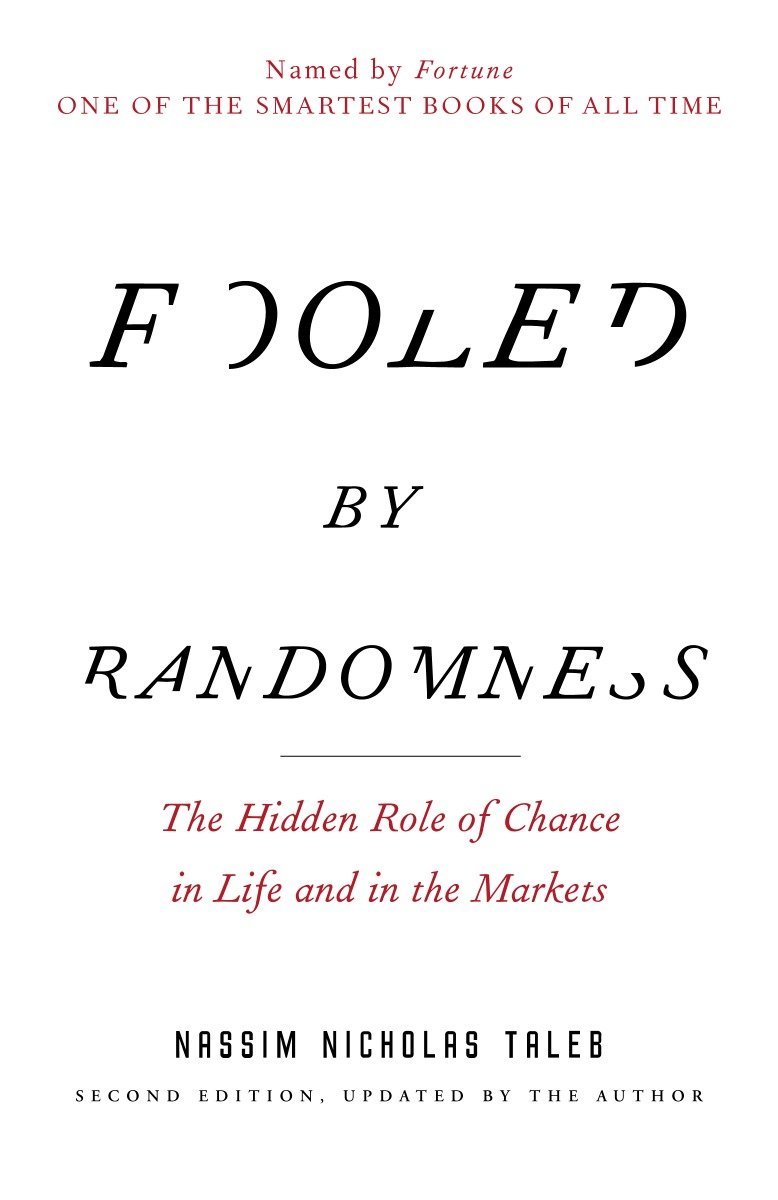
Notes on
Fooled by Randomness
by Nassim Nicholas Taleb
• 5 min read
“Past events will always look less random than they were (it is called the hindsight bias).”
“Probability is not a mere computation of odds on the dice or more complicated variants; it is the acceptance of the lack of certainty in our knowledge and the development of methods for dealing with our ignorance. Outside of textbooks and casinos, probability almost never presents itself as a mathematical problem or a brain teaser. Mother nature does not tell you how many holes there are on the roulette table, nor does she deliver problems in a textbook way (in the real world one has to guess the problem more than the solution).”
“Let me make it clear here: Of course chance favors the prepared! Hard work, showing up on time, wearing a clean (preferably white) shirt, using deodorant, and some such conventional things contribute to success—they are certainly necessary but may be insufficient as they do not cause success. The same applies to the conventional values of persistence, doggedness and perseverance: necessary, very necessary. One needs to go out and buy a lottery ticket in order to win. Does it mean that the work involved in the trip to the store caused the winning? Of course skills count…”
“Furthermore, as most successes are caused by very few “windows of opportunity,” failing to grab one can be deadly for one’s career. Take your luck!”
“Reality is far more vicious than Russian roulette. First, it delivers the fatal bullet rather infrequently, like a revolver that would have hundreds, even thousands, of chambers instead of six. After a few dozen tries, one forgets about the existence of a bullet, under a numbing false sense of security. The point is dubbed in this book the black swan problem”
“Heroes are heroes because they are heroic in behavior, not because they won or lost.”
“The reader can imagine my disappointment at realizing, while growing up as a practitioner of randomness, that most poetic sounding adages are plain wrong. Borrowed wisdom can be vicious. I need to make a huge effort not to be swayed by well-sounding remarks. I remind myself of Einstein’s remark that common sense is nothing but a collection of misconceptions acquired by age eighteen. Furthermore, What sounds intelligent in a conversation or a meeting, or, particularly, in the media, is suspicious.”
“trader’s mental construction should direct him to do precisely what other people do not do.” — this reminds me of the ‘be fearful when others are greedy, be greedy when others are fearful’ quote.
Beware of randomness. Sometimes we attribute to determinism what is actually randomness - see signals which are actually noise. Often seen with rich people who act as if the reason for their success was hard work; sure, it contributed - but it wasn’t the reason. Just like winning the Lottery. There are steps necessary to be able to win it (going to the store and buying the ticket, i.e. the hard work), but winning or not is up to chance.
Beware of biases. Like survivorship bias.
“A tendency to get married to positions. There is a saying that bad traders divorce their spouse sooner than abandon their positions. Loyalty to ideas is not a good thing for traders, scientists—or anyone.”
Be willing to discard your beloved ideas if the facts go against them.
“an event, although rare, that brings large consequences cannot just be ignored.”
“Another logical flaw in this type of historical statement is that often when a large event takes place, you hear the “it never happened before,” as if it needed to be absent from the event’s past history for it to be a surprise. So why do we consider the worst case that took place in our own past as the worst possible case? If the past, by bringing surprises, did not resemble the past previous to it (what I call the past’s past), then why should our future resemble our current past?”
“Regression to the Mean The “hot hand in basketball” is another example of misperception of random sequences: It is very likely in a large sample of players for one of them to have an inordinately lengthy lucky streak. As a matter of fact it is very unlikely that an unspecified player somewhere does not have an inordinately lengthy lucky streak. This is a manifestation of the mechanism called regression to the mean. I can explain it as follows: Generate a long series of coin flips producing heads and tails with 50% odds each and fill up sheets of paper. If the series is long enough you may get eight heads or eight tails in a row, perhaps even ten of each. Yet you know that in spite of these wins the conditional odds of getting a head or a tail is still 50%. Imagine these heads and tails as monetary bets filling up the coffers of an individual. The deviation from the norm as seen in excess heads or excess tails is here entirely attributable to luck, in other words, to variance, not to the skills of the hypothetical player (since there is an even probability of getting either).”
“I am also realizing the nonlinear effect behind success in anything: It is better to have a handful of enthusiastic advocates than hordes of people who appreciate your work—better to be loved by a dozen than liked by the hundreds. This applies to the sales of books, the spread of ideas, and success in general and runs counter to conventional logic.”
“Wittgenstein’s ruler: Unless you have confidence in the ruler’s reliability, if you use a ruler to measure a table you may also be using the table to measure the ruler.”
Liked these notes? Join the newsletter.
Get notified whenever I post new notes.